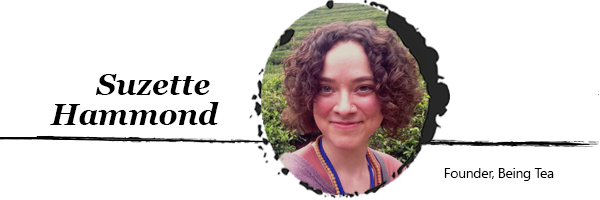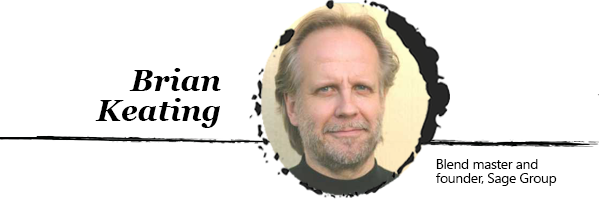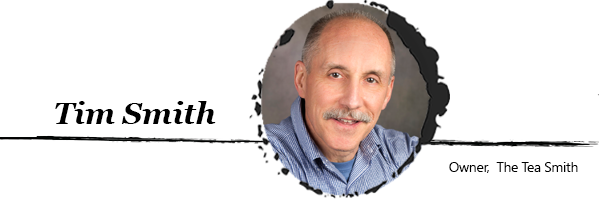World Tea News asked tea industry leaders for their insights regarding threats to the tea industry and they shared their feedback.
Here we asked:
 I see three main challenges facing the tea industry: The evolving regulatory compliance changes, consistent weather issues at origin and a lack of the next generation of tea workers at origin. The first is rather easy to tackle. There are several tea consultants who focus on this area to help companies meet these requirements to lessen the burden and several venues exist in which to learn the aspects of these regulations that affect food handling. The weather issue is a much bigger global issue that takes efforts from all parties to come together and agree on mass global strategies. The latter, I feel, can be overcome if we do our part by connecting with the growers and the workers in the field, start paying a higher price for the teas so the workers in the field that do all the “heavy lifting” get better pay and drive the next generations back to the estates and away from the “big” city jobs.
I see three main challenges facing the tea industry: The evolving regulatory compliance changes, consistent weather issues at origin and a lack of the next generation of tea workers at origin. The first is rather easy to tackle. There are several tea consultants who focus on this area to help companies meet these requirements to lessen the burden and several venues exist in which to learn the aspects of these regulations that affect food handling. The weather issue is a much bigger global issue that takes efforts from all parties to come together and agree on mass global strategies. The latter, I feel, can be overcome if we do our part by connecting with the growers and the workers in the field, start paying a higher price for the teas so the workers in the field that do all the “heavy lifting” get better pay and drive the next generations back to the estates and away from the “big” city jobs.
 The seismic shift of the retail marketplace definitely has people spooked, especially because it's affecting chain retailers in tea (with Teavana and David's Tea, American Tea Room, among others). And yet, tea is still definitely a growing market. Some things remain the same, despite this turmoil. Consumers very much love tea. They love the message behind it, the pull toward a healthier way of life, the reduction of stress and the connection to creative culture. It's tactile, colorful, natural, personal—everything intuitive brands across other sectors strive for. If retailers listen to that and think creatively about how to deliver it—being willing to try new approaches, develop more nimble marketing, packaging and product strategies, etc.—tea can continue to grow. But this way of doing things in retail that we have been for decades now simply will not carry forward. The world has changed too much. I think the key is honestly embracing change and everything it represents. Change must not be the enemy, is must be the blank canvas and the inspiration. We won't survive unless we see it as building possibility and not signaling collapse.
The seismic shift of the retail marketplace definitely has people spooked, especially because it's affecting chain retailers in tea (with Teavana and David's Tea, American Tea Room, among others). And yet, tea is still definitely a growing market. Some things remain the same, despite this turmoil. Consumers very much love tea. They love the message behind it, the pull toward a healthier way of life, the reduction of stress and the connection to creative culture. It's tactile, colorful, natural, personal—everything intuitive brands across other sectors strive for. If retailers listen to that and think creatively about how to deliver it—being willing to try new approaches, develop more nimble marketing, packaging and product strategies, etc.—tea can continue to grow. But this way of doing things in retail that we have been for decades now simply will not carry forward. The world has changed too much. I think the key is honestly embracing change and everything it represents. Change must not be the enemy, is must be the blank canvas and the inspiration. We won't survive unless we see it as building possibility and not signaling collapse.
 Tea enjoyed the prime spotlight position within social and mainstream media for years. This coveted spot is being crowded out by the exceptional promotional efforts within the coffee industry and other beverages. The specialty tea industry needs a trade association and soon.
Tea enjoyed the prime spotlight position within social and mainstream media for years. This coveted spot is being crowded out by the exceptional promotional efforts within the coffee industry and other beverages. The specialty tea industry needs a trade association and soon.
 There are two threats I’m especially keen on currently. The first is that market awareness of premium whole leaf tea and its benefits could be partially obscured by some of the more outrageous tea detox claims and the flooding of the marketplace with promises of quick tea weight loss gimmicks. We tend to call any infused beverage tea. This includes anything from the lowest-quality products marketed as tea, with little or no tea in them; to the highest-quality premium whole leaf teas. If that entire range melds into one in consumers’ minds, then the premium tea segment will suffer a setback in terms of education and appreciation. The other threat I’m concerned about is that with the closing of 300-plus Teavana retail tea stores (regardless of what you may have thought of their marketing and selection) that’s a significant number of points of presence which did sell real teas across the U.S. which are no longer there. Many view this as an opportunity, which of course on the one hand it is, but for my money, I’d rather still have Teavana out there introducing customers to whole leaf tea rather than just sugared tea-like beverages being sold at Starbucks.
There are two threats I’m especially keen on currently. The first is that market awareness of premium whole leaf tea and its benefits could be partially obscured by some of the more outrageous tea detox claims and the flooding of the marketplace with promises of quick tea weight loss gimmicks. We tend to call any infused beverage tea. This includes anything from the lowest-quality products marketed as tea, with little or no tea in them; to the highest-quality premium whole leaf teas. If that entire range melds into one in consumers’ minds, then the premium tea segment will suffer a setback in terms of education and appreciation. The other threat I’m concerned about is that with the closing of 300-plus Teavana retail tea stores (regardless of what you may have thought of their marketing and selection) that’s a significant number of points of presence which did sell real teas across the U.S. which are no longer there. Many view this as an opportunity, which of course on the one hand it is, but for my money, I’d rather still have Teavana out there introducing customers to whole leaf tea rather than just sugared tea-like beverages being sold at Starbucks.
 Supply is always an issue. Some of the challenges come from weather, and as we have seen in Darjeeling, local instability. In the U.S., if the us vs. them mentality that is being promoted in national leadership continues, trade relations and attitudes toward traditional tea producing countries may suffer.
Supply is always an issue. Some of the challenges come from weather, and as we have seen in Darjeeling, local instability. In the U.S., if the us vs. them mentality that is being promoted in national leadership continues, trade relations and attitudes toward traditional tea producing countries may suffer.
 Lack of organization and cooperation. We don’t have a focused entity working for specialty tea in a way that engages and educates a broad market. This forces each individual retailer who is on the front line with customer service carrying the responsibility with very little support. This is another of the challenges—not only for the independent retailers, but we also see this factoring into the store closures of major brands.
Lack of organization and cooperation. We don’t have a focused entity working for specialty tea in a way that engages and educates a broad market. This forces each individual retailer who is on the front line with customer service carrying the responsibility with very little support. This is another of the challenges—not only for the independent retailers, but we also see this factoring into the store closures of major brands.
 The obsessive focus on food safety throughout the supply chain in response to FSMA and litigation is stifling innovation and creating huge costs yet the product itself has not changed. While not minimizing the importance of the subject matter we need to be very careful not to lose sight of the goal—increased demand for and consumption of tea—which will never happen as long as companies are more focused on defense than attack. I believe as an industry we need to better leverage the preparation step of brewing tea in the context of food safety issues and regulations. This topic is part of an ongoing dialogue between the Tea Associations of the USA/Canada and the relevant regulatory authorities in those countries.
The obsessive focus on food safety throughout the supply chain in response to FSMA and litigation is stifling innovation and creating huge costs yet the product itself has not changed. While not minimizing the importance of the subject matter we need to be very careful not to lose sight of the goal—increased demand for and consumption of tea—which will never happen as long as companies are more focused on defense than attack. I believe as an industry we need to better leverage the preparation step of brewing tea in the context of food safety issues and regulations. This topic is part of an ongoing dialogue between the Tea Associations of the USA/Canada and the relevant regulatory authorities in those countries.
What is the biggest threat the tea industry faces in the coming year and how can the industry overcome it?
 I see three main challenges facing the tea industry: The evolving regulatory compliance changes, consistent weather issues at origin and a lack of the next generation of tea workers at origin. The first is rather easy to tackle. There are several tea consultants who focus on this area to help companies meet these requirements to lessen the burden and several venues exist in which to learn the aspects of these regulations that affect food handling. The weather issue is a much bigger global issue that takes efforts from all parties to come together and agree on mass global strategies. The latter, I feel, can be overcome if we do our part by connecting with the growers and the workers in the field, start paying a higher price for the teas so the workers in the field that do all the “heavy lifting” get better pay and drive the next generations back to the estates and away from the “big” city jobs.
I see three main challenges facing the tea industry: The evolving regulatory compliance changes, consistent weather issues at origin and a lack of the next generation of tea workers at origin. The first is rather easy to tackle. There are several tea consultants who focus on this area to help companies meet these requirements to lessen the burden and several venues exist in which to learn the aspects of these regulations that affect food handling. The weather issue is a much bigger global issue that takes efforts from all parties to come together and agree on mass global strategies. The latter, I feel, can be overcome if we do our part by connecting with the growers and the workers in the field, start paying a higher price for the teas so the workers in the field that do all the “heavy lifting” get better pay and drive the next generations back to the estates and away from the “big” city jobs.
—Scott Svihula Owner of Hula Consulting
 The seismic shift of the retail marketplace definitely has people spooked, especially because it's affecting chain retailers in tea (with Teavana and David's Tea, American Tea Room, among others). And yet, tea is still definitely a growing market. Some things remain the same, despite this turmoil. Consumers very much love tea. They love the message behind it, the pull toward a healthier way of life, the reduction of stress and the connection to creative culture. It's tactile, colorful, natural, personal—everything intuitive brands across other sectors strive for. If retailers listen to that and think creatively about how to deliver it—being willing to try new approaches, develop more nimble marketing, packaging and product strategies, etc.—tea can continue to grow. But this way of doing things in retail that we have been for decades now simply will not carry forward. The world has changed too much. I think the key is honestly embracing change and everything it represents. Change must not be the enemy, is must be the blank canvas and the inspiration. We won't survive unless we see it as building possibility and not signaling collapse.
The seismic shift of the retail marketplace definitely has people spooked, especially because it's affecting chain retailers in tea (with Teavana and David's Tea, American Tea Room, among others). And yet, tea is still definitely a growing market. Some things remain the same, despite this turmoil. Consumers very much love tea. They love the message behind it, the pull toward a healthier way of life, the reduction of stress and the connection to creative culture. It's tactile, colorful, natural, personal—everything intuitive brands across other sectors strive for. If retailers listen to that and think creatively about how to deliver it—being willing to try new approaches, develop more nimble marketing, packaging and product strategies, etc.—tea can continue to grow. But this way of doing things in retail that we have been for decades now simply will not carry forward. The world has changed too much. I think the key is honestly embracing change and everything it represents. Change must not be the enemy, is must be the blank canvas and the inspiration. We won't survive unless we see it as building possibility and not signaling collapse.
—Suzette Hammond Founder of Being Tea, tea trainer and consultant
 Tea enjoyed the prime spotlight position within social and mainstream media for years. This coveted spot is being crowded out by the exceptional promotional efforts within the coffee industry and other beverages. The specialty tea industry needs a trade association and soon.
Tea enjoyed the prime spotlight position within social and mainstream media for years. This coveted spot is being crowded out by the exceptional promotional efforts within the coffee industry and other beverages. The specialty tea industry needs a trade association and soon.
—Brian Keating Blend Master & Founder of Sage Group
 There are two threats I’m especially keen on currently. The first is that market awareness of premium whole leaf tea and its benefits could be partially obscured by some of the more outrageous tea detox claims and the flooding of the marketplace with promises of quick tea weight loss gimmicks. We tend to call any infused beverage tea. This includes anything from the lowest-quality products marketed as tea, with little or no tea in them; to the highest-quality premium whole leaf teas. If that entire range melds into one in consumers’ minds, then the premium tea segment will suffer a setback in terms of education and appreciation. The other threat I’m concerned about is that with the closing of 300-plus Teavana retail tea stores (regardless of what you may have thought of their marketing and selection) that’s a significant number of points of presence which did sell real teas across the U.S. which are no longer there. Many view this as an opportunity, which of course on the one hand it is, but for my money, I’d rather still have Teavana out there introducing customers to whole leaf tea rather than just sugared tea-like beverages being sold at Starbucks.
There are two threats I’m especially keen on currently. The first is that market awareness of premium whole leaf tea and its benefits could be partially obscured by some of the more outrageous tea detox claims and the flooding of the marketplace with promises of quick tea weight loss gimmicks. We tend to call any infused beverage tea. This includes anything from the lowest-quality products marketed as tea, with little or no tea in them; to the highest-quality premium whole leaf teas. If that entire range melds into one in consumers’ minds, then the premium tea segment will suffer a setback in terms of education and appreciation. The other threat I’m concerned about is that with the closing of 300-plus Teavana retail tea stores (regardless of what you may have thought of their marketing and selection) that’s a significant number of points of presence which did sell real teas across the U.S. which are no longer there. Many view this as an opportunity, which of course on the one hand it is, but for my money, I’d rather still have Teavana out there introducing customers to whole leaf tea rather than just sugared tea-like beverages being sold at Starbucks.
—Maria Uspenski Founder and CEO of The Tea Spot, author of Cancer Hates Tea
 Supply is always an issue. Some of the challenges come from weather, and as we have seen in Darjeeling, local instability. In the U.S., if the us vs. them mentality that is being promoted in national leadership continues, trade relations and attitudes toward traditional tea producing countries may suffer.
Supply is always an issue. Some of the challenges come from weather, and as we have seen in Darjeeling, local instability. In the U.S., if the us vs. them mentality that is being promoted in national leadership continues, trade relations and attitudes toward traditional tea producing countries may suffer.
—Tim Smith Owner of The Tea Smith
 Lack of organization and cooperation. We don’t have a focused entity working for specialty tea in a way that engages and educates a broad market. This forces each individual retailer who is on the front line with customer service carrying the responsibility with very little support. This is another of the challenges—not only for the independent retailers, but we also see this factoring into the store closures of major brands.
Lack of organization and cooperation. We don’t have a focused entity working for specialty tea in a way that engages and educates a broad market. This forces each individual retailer who is on the front line with customer service carrying the responsibility with very little support. This is another of the challenges—not only for the independent retailers, but we also see this factoring into the store closures of major brands.
—Babette Donaldson President of the International Tea Sipper’s Society, author, tea educator
 The obsessive focus on food safety throughout the supply chain in response to FSMA and litigation is stifling innovation and creating huge costs yet the product itself has not changed. While not minimizing the importance of the subject matter we need to be very careful not to lose sight of the goal—increased demand for and consumption of tea—which will never happen as long as companies are more focused on defense than attack. I believe as an industry we need to better leverage the preparation step of brewing tea in the context of food safety issues and regulations. This topic is part of an ongoing dialogue between the Tea Associations of the USA/Canada and the relevant regulatory authorities in those countries.
The obsessive focus on food safety throughout the supply chain in response to FSMA and litigation is stifling innovation and creating huge costs yet the product itself has not changed. While not minimizing the importance of the subject matter we need to be very careful not to lose sight of the goal—increased demand for and consumption of tea—which will never happen as long as companies are more focused on defense than attack. I believe as an industry we need to better leverage the preparation step of brewing tea in the context of food safety issues and regulations. This topic is part of an ongoing dialogue between the Tea Associations of the USA/Canada and the relevant regulatory authorities in those countries.
—Richard Enticott Owner of Meridian Trading Company
